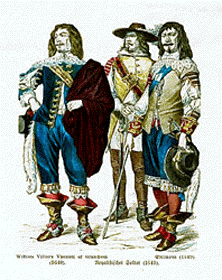Ben Jonson, Robert Herrick, & John Suckling

 |
My sin was too much hope of thee, lov'd boy. Seven years tho' wert lent to me, and I thee pay, Exacted by thy fate, on the just day. O, could I lose all father now! For why Will man lament the state he should envy? To have so soon 'scap'd world's and flesh's rage, And if no other misery, yet age? Rest in soft peace, and, ask'd, say, "Here doth lie Ben Jonson his best piece of poetry." For whose sake henceforth all his vows be such, As what he loves may never like too much. |
1. What does Jonson say was his sin and the price he pays for it? Given these statements, how do you think Jonson is handling his son's death? 2. What reasons does Jonson give to envy his son's state? Why might he still lament this state despite all these reasons? 3. What will Jonson do henceforth for his son's sake? Why? Evaluate and Connect |
And I will pledge with mine; Or leave a kiss but in the cup, And I'll not look for wine. The thirst that from the soul doth rise Doth ask a drink divine; But might I of Jove's nectar sup, I would not change for thine. I sent thee late a rosy wreath, |
1. What would the speaker sacrifice for a kiss? How valuable is Celia's kiss? Explain. 2. What reason does the speaker give for sending the wreath? What is he implying? 3. Describe the speaker's feelings for Celia. Do you think Celia returns his feelings? Why or why not? Evaluate and Connect |
Old Time is still a-flying: And this same flower that smiles today Tomorrow will be dying. The glorious lamp of heaven, the Sun, That age is best which is the first, Then be not coy, but use your time; |
1. What warning does the speaker impart in lines 3-4? In your opinion, what message is the speaker trying to convey in the first stanza? 2. In this poem, what might rosebuds symbolize (see page R16)? 3. In the second stanza, what metaphor (see page R9) does the speaker use to describe the sun? How does the path of the sun reinforce the speaker's message? 4. Summarize the speaker's views on youth and age expressed in the third stanza. 5. What conclusion does the speaker reach in the last stanza? How could you restate the last two lines? Evaluate and Connect |
Three whole days together! And am like to love three more, If it prove fair weather. Time shall moult away his wings But the spite on 't is, no praise Had it any been but she, |
1. How long has the speaker been in love thus far? How much longer will he be in love "if it prove fair weather"? What do these statements suggest about the speaker's love? 2. Irony is the contrast between appearance and reality. What is ironic about the speaker's claim in the second stanza? 3. According to the speaker, who deserves the praise for his fidelity? Why? What does this tell you about him? Evaluate and Connect |
Prithee, why so pale? Will, when looking well can't move her, Looking ill prevail? Prithee, why so pale? Why so dull and mute, young sinner? Quit, quit for shame! |
1. Paraphrase the speaker's questions in lines 3-4 and lines 8-9. What point might the speaker be trying to make by asking these questions? 2. What advice does the speaker give the lover? What does this advice suggest about the speaker's attitude toward love? 3. Why might the speaker in this poem feel that the pale lover is "fond," or foolish? Evaluate and Connect |